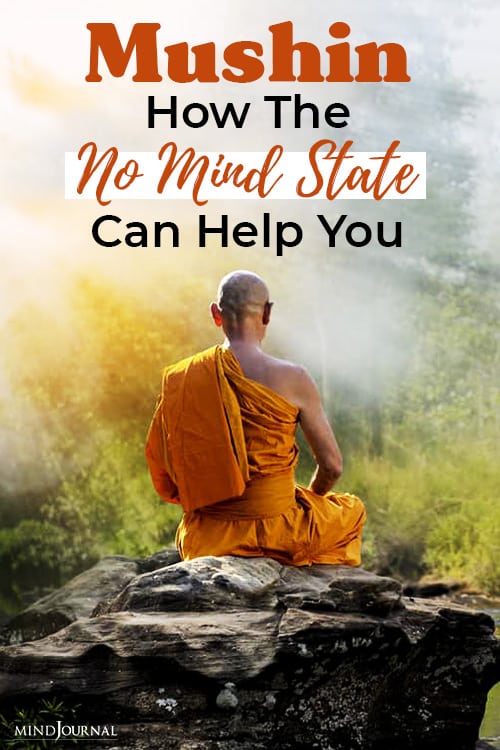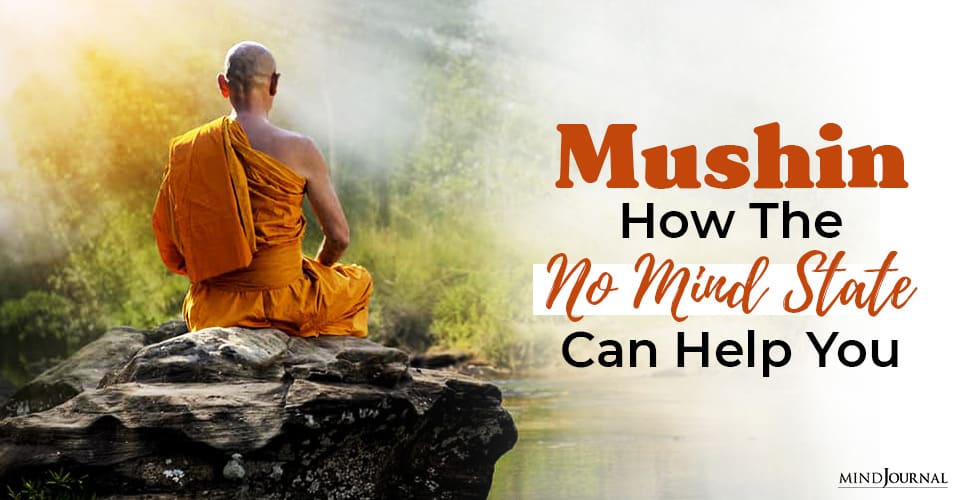Mushin: The state of no mind is a Zen practice to awaken your consciousness and experience complete awareness of the self.
Do you find your mind busy most of the time? Is your mind always thinking about things that are not even important? Most of us lack awareness of the mind and this leads to a gross lack in awareness of the self. Hence, our mind starts creating stories by imagining ‘what if’ scenarios. What if we took that job? What if we didn’t breakup? What if we left everything behind? These kinds of thoughts are damaging to the self and we need to eradicate them by developing a state of “no mind.”
The no-mind state is a Zen practice of self-awareness. It shows that when the mind ceases to be riddled by thoughts, our genuine self emerges.
Our thinking mind limits and prevents us from existing in a larger reality of the self. No mind is a state of being which enables us to be our whole selves, a self that is free of fear, sorrow, happiness or ecstasy. It is a state where we are nothing, yet everything.
Read Five Zen Stories and What They Can Teach Us
What is a ‘No Mind’ state?
No Mind is a state of pure consciousness and leads to complete awareness of the self. It is a state of mind that challenges you to connect with your inner self by eliminating all thoughts, especially self-limiting beliefs.
It is a state where you are beyond thoughts, notions, beliefs, principles, ideologies, fear, anger or even happiness. No Mind is a state of nothingness. A state of bliss.
Although practicing meditation can help you achieve this state, it is not necessary to spend hours to achieve this state of nothingness. However, you do need to be aware of your mind to identify how it jumps from one thought to another without any purpose.
When you detach from your thoughts and observe them without getting involved or judging them, you will be able to connect with your pure self.
As you detach from everything, even your own thoughts, and emotions, you become pure and observe everything with love and compassion. No mind is a state where there is no attachment or judgment. Where duality doesn’t exist. Where you accept yourself and everyone else as they are. You don’t see anyone as separate. Man & woman, beauty & ugliness, good & bad, birds & animals, stones & gold… all unite as a part of nature. As you see everyone and everything as the same, you become a part of the universe. You become the universe.
Read 7 Signs The Universe Is Guiding You To Your Destiny
Mushin: The Art of No Mindedness

According to Zen Buddhism philosophies, the state of no-mind operates very fast but without any conscious direction or plan. Hence, it is free, flexible and adaptable like the water and the wind. The concept of no-mind is, in part, derived from the Zen expression Mushin, which is the core essence of Japanese martial arts.
Mushin is a mental state, derived from the word ‘Mu’ means “nothingness” and ‘Shin’ means “heart, mind or spirit.”
Daoist & Zen meditators, as well as trained martial artists, strive to reach this mental state through rigorous training, meditation, and daily activities.
In ancient times, the Samurai warrior wielded his sword in battle without any conscious thought. Thinking would have interrupted the swordsman’s flow and lead to his death. This is the same with modern-day martial artists and athletes. When a martial artist is in a state of no-mindedness and relies solely on his training, meditation, and natural instinct, he can become one with his art form…his sword.
It is when his mind is free from fear, anger, or ego during a battle or in everyday life. As he is free from thought, he is free to instantly act and react without disturbance or hesitation.
“The mind must always be in the state of ‘flowing,’ for when it stops anywhere that means the flow is interrupted and it is this interruption that is injurious to the well-being of the mind. In the case of the swordsman, it means death. When the swordsman stands against his opponent, he is not to think of the opponent, nor of himself, nor of his enemy’s sword movements. He just stands there with his sword which, forgetful of all technique, is ready only to follow the dictates of the subconscious. The man has effaced himself as the wielder of the sword. When he strikes, it is not the man but the sword in the hand of the man’s subconscious that strikes.” – Zen master Takuan Sōhō
Mushin is the “mind without mind”. However, it is not a state when your mind is empty. It simply means an absence of the ego, distractions, worries & preoccupations. It is when your mind is completely free and present with full awareness of the self. Mushin is not something that you can understand. It is something you need to experience. It is the flawless realization of the self.
Read How to Attain Self Realization and Control Your Life
Awaken into the no mind state
The path to a state of no mind is paved with relaxation. It is only by allowing yourself to be who you truly are without judgment, you get into the state of no mind.
Allow all your emotions, thoughts, sensations to just be and accept them unconditionally. Allow and accept it all to a point where you are free to be exactly who you are. When you allow and accept, instead of resisting, you can truly relax and let everything be. Only then, there will be no thinking or doing. Without complete acceptance, there is no state of no-mindedness.
The more you try to fight or suppress your thoughts, the more effort you apply, and the more you will limit yourself from achieving awareness of the self that is true. Resistance will only result in separation from your true self. When you allow the thinking to flow naturally without holding onto them, your awareness is on the allowing of your thoughts and not on the content of the thoughts. Allowing is the key to awareness.
Read How to Develop Self Awareness: 9 Must-See Tips for a Better Life
Although thinking can still occur in this awareness, the content of your thoughts will now become irrelevant. Only your awareness is relevant. And your awareness will recognize the peace that is inside you. With this inner peace, you will realize that thinking is a part of the flow of energy. This energy is peace. This energy is consciousness. Now your mind becomes aware of the flow of peace and consciousness. This is when you attain a state of no mind.
No-mind is not about having no thoughts. It is about identifying and being aware of the source of your thoughts; the source of your mind.
How does “no mind state” apply to modern life?
The state of no mind can certainly help us attain complete awareness of the self, but can it help us in our modern daily lives? Does it have any significance in a practical, non-spiritual way?
Yes, it does. Our mind is everything as it guides us towards what is good for us, to live a life that is happy, meaningful and fulfilling. Once our basic needs are met, our mind becomes free and limitless to flow without any intention. This can empower us to overcome any challenges or make the most of available opportunities that lie ahead of us. And this can be done with exceptional presence.
When we are able to apply unbound presence in our daily lives, it can help us with having –
- A clearer vision of reality & existence
- Enlightened view on what actually matters in life
- Stronger & healthier romantic relationships
- Better and more engaging social interactions
- More meaningful connections with others
- Enhanced work performance
- Improved problem-solving & decision-making skills
- Dramatically increased levels of confidence
- Extremely decreased feelings of anxiety, fear, stress & worry
- Enhanced focus on steady progress with minimal distraction
- Better human experience
- Improved flow of energy
As your mind becomes less influenced by emotionally driven thoughts and reflection, you learn to see things exactly as they are. You will become more responsive and less reactive to various circumstances. You will become more emotionally mature and learn to detach yourself from people and situations that don’t serve your best interest. As a result, you will be able gain better control over yourself, gain mental strength, behave rationally, accomplish goals and pursue fulfillment in life.
Read 7 Simple Strategies to Increasing Mindfulness in as Little as 30 Seconds
No-Mind is pure awareness of the self
“I am not my mind, because I can observe my thoughts. So the observer is different from the observed – I am not my mind.” – Osho
The state of no-mind is pure consciousness. Your thoughts will disappear as your awareness becomes stronger and deeper. Nothingness will restore your inner peace. Harmony will resurface through stillness. Consciousness will lead to pure bliss. And the self will become aware of its unbound, limitless nature. The self is present everywhere. It is within you and in the infinite universe. The self is the universe. When we become aware and connect with the self, we feel inner peace.
The state of no-mind may be a difficult concept for some of us to grasp. But when you attain this state, you enter a realm of consciousness and spirituality that only the enlightened and the awakened can experience. As you observe everything from a detached perspective, your pure self emerges. There is no past, present or future. There is just pure existence.
Here is an interesting video on Mushin: no mind state that you may find helpful:












Leave a Reply